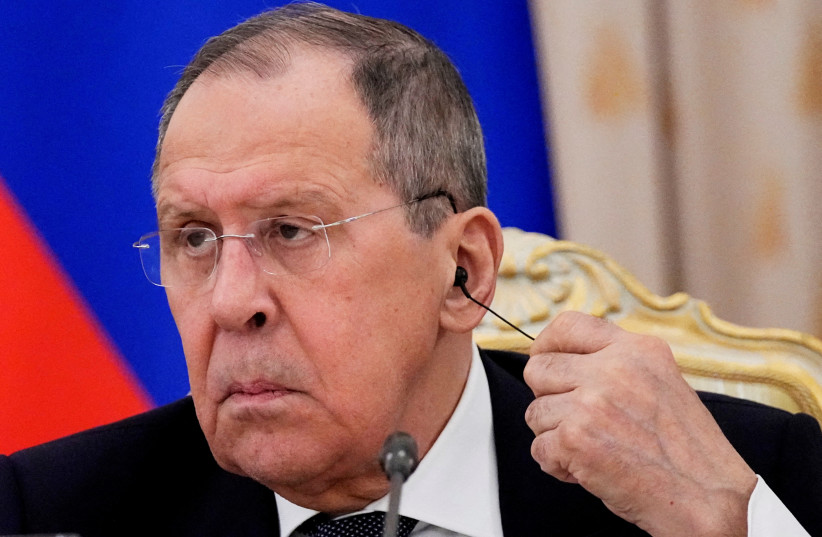Russian Chief Rabbi Berel Lazar has criticized remarks by his country’s foreign minister, who suggested that the worst antisemites were Jewish and that Adolf Hitler had Jewish ancestry.
Lazar’s forthright criticism of Foreign Minister Sergei Lavrov’s remarks Sunday — he called them “shocking” and said he wished Lavrov would apologize — is unusual in Russia, where other clergy have been supportive of the war in Ukraine and where dissent is largely illegal.
Widely viewed as having close ties with Russian President Vladimir Putin, Lazar and the organization he leads, the Chabad Lubavitch-affiliated Federation of Jewish Communities of Russia, have expressed displeasure with the war while refraining from criticizing the Putin regime directly over it.
On Wednesday, the president of the Federation of Jewish Communities of Russia, Rabbi Alexander Boroda addressed the interview: "In view of the current informational situation surrounding Lavrov’s words on possible Jewish roots of Adolf Hitler, we find it necessary to call for an end of usage of national origin of opponents, as well as references to the history of the Second World War, which requires proper protection and piety, because the echoes of those events are still an open wound for the peoples of the world.
"Such national markers are inherently explosive and can aggravate inter-ethnic relations in the international arena and both within the country and society.
"If contentious historical debates were acceptable until recently, now that perception of facts is too inflamed, they are completely impermissible. They bring devastating destructive effects on horizontal connections in societies and on human relationships.
"Even when such statements are made without any ill intent, they become a powerful catalyst for further destructive action. Under any circumstances, the Jewish community will guard the sanctity of the Holocaust’s tragedy, remember both the murderers, stained by the blood of millions of innocent victims and the heroes who stopped the machine of death."
In March, Boroda, the strongest leader in the Russian Jewish community, after Chief Rabbi Berel Lazar, was quoted saying that "it's hard to understand why neo-Nazism asserting itself in Ukraine." He said: “It is difficult to understand that in Ukraine, where there is a fairly large and largely prosperous Jewish community, the glorification of criminals responsible for the death of the ancestors of those Jews is going on in parallel.”

“I do not consider myself entitled to give advice to the head of Russian diplomacy — but it would be nice if he apologized to the Jews and simply admitted that he was mistaken,” Lazar wrote in a reply to a request for comment by the Jewish Telegraphic Agency.
“I think it would then be possible to consider the incident settled and turn the page,” Lazar added.
Meanwhile, the Russian foreign ministry doubled down on the controversial remarks amid a diplomatic row about them with Israel, adding to a growing number of signs that Lavrov’s comments could mark a turning point for Israeli leaders who previously had not condemned Russia’s invasion of Ukraine with the same force as other world leaders.
“We paid attention to the anti-historical statements of the head of the Israeli Foreign Ministry @yairlapid , which largely explain the course of the current Israeli Government support of the neo-Nazi regime in Kyiv,” Russia’s ministry tweeted.
Lavrov’s remarks appeared to be an attempt to reconcile the fact that Ukraine’s president, Volodymyr Zelensky, is Jewish, with Russia’s declared reason for the Feb. 24 invasion. Putin said Ukraine was in need of “denazification.”
“When they say that Nazification cannot exist if there are Jews [in charge]: In my opinion even Hitler had Jewish origins so it means absolutely nothing,” Lavrov told Italy’s Channel 4 on Sunday. “Jewish wise people said already a long time ago that the biggest antisemites are Jewish themselves.”
The remarks prompted a stream of condemnations by Jewish groups and Israeli officials, including Prime Minister Naftali Bennett, who called them “lies.” Foreign Minister Yair Lapid called Lavrov’s remarks “both inexcusable and scandalous and also a terrible historical error.”
Bennett’s comments were notable because he has held back from criticizing Russia sharply even as Lapid has struck a more forceful tone, a balancing act that is widely understood as meant to allow Israel, which has strategic interests with Russia, to maintain a degree of neutrality.
But as the war grinds on, that neutrality may be eroding: Israel is sending more defensive weapons and aid to Ukraine, and Russia, isolated internationally, is increasingly engaging with Iran, Israel’s nemesis. Lavrov’s comments represent another breach.
On Tuesday, the Russian foreign ministry accused Israel of supporting “the neo-Nazi regime in Kyiv” for protesting Lavrov’s rhetoric.
Lazar said it was “inappropriate to draw any comparisons” between the Holocaust and current affairs. Referring to the role that Soviet forces played in defeating the Nazis, he told JTA that such a comparison “belittles the achievement of these heroic soldiers who liberated Auschwitz and hoisted the banner of victory over the Reichstag.”
